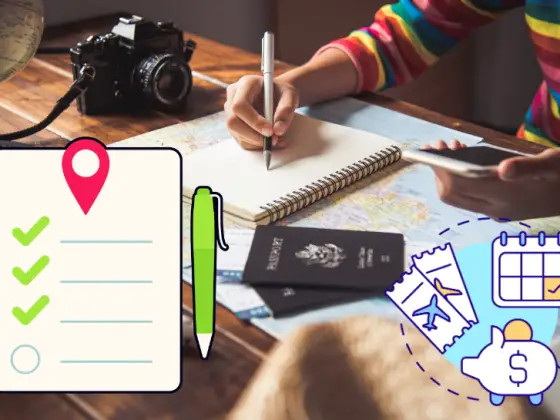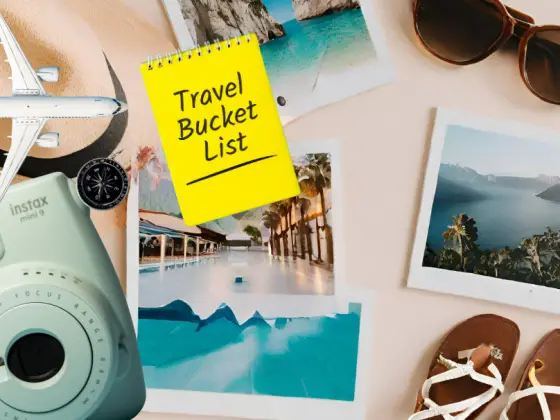1. Research the Location
Before you start packing your bags, delve into the specifics of your chosen hotel’s location. It’s not just about convenience; safety plays a crucial role too. Research the neighborhood or district where the hotel is situated, and read up on reviews and local news.
- Investigate the area’s safety and convenience: Are there any safety concerns, high crime rates, or unsavory neighborhoods nearby?
- Check proximity to attractions and transportation hubs: How close are you to the places you want to visit? Is there a subway station or bus stop within walking distance?
2. Know Your Budget
It’s easy to get carried away with extravagant hotel options, but it’s essential to stick to your budget. Consider not just the room rate but also potential additional expenses, such as dining, parking, and entertainment.
- Set a clear budget for your stay. Determine how much you’re willing to spend on accommodations.
- Consider additional expenses like dining and parking. Budget for meals, snacks, and any parking fees that might apply.
3. Choose the Right Room Type
Hotels offer a variety of room types, from standard to suites, and it’s crucial to understand the differences in amenities to choose the one that suits your needs.
- Understand room categories and their amenities: What’s the difference between a standard room and a deluxe suite? Does a more expensive room provide additional perks?
- Select the room that best suits your needs. Consider your preferences for space, comfort, and any special requirements you may have.
4. Read Reviews
Reviews from previous guests can provide valuable insights into the quality of a hotel. Be sure to read recent, authentic reviews to get a well-rounded view of the property.
- Look for recent, genuine guest reviews. Pay attention to feedback from guests who have stayed at the hotel recently. Outdated reviews may not reflect the current state of the property.
- Pay attention to both positive and negative feedback. While glowing reviews are great, don’t ignore negative comments. They can give you a heads-up about potential issues.
5. Compare Booking Platforms
Don’t settle for the first booking platform you come across. Take the time to compare prices on various websites and explore any loyalty program discounts you may be eligible for.
- Compare prices on various booking websites: Different platforms may offer different rates for the same room.
- Consider loyalty program discounts: If you’re a member of a hotel’s loyalty program or have certain credit cards, you might be entitled to special discounts.
6. Check the Hotel’s Website
The hotel’s official website can be a treasure trove of information. It’s where you can find exclusive deals, promotions, and detailed information about the property.
- Look for exclusive deals and promotions. Hotels often offer discounts or packages that are only available on their own websites.
- Verify specific amenities and policies: Ensure that the hotel provides the amenities you’re looking for and review their policies regarding cancellation, check-in, and check-out.
7. Consider Loyalty Programs
Loyalty programs can provide a host of perks and rewards. If you frequently stay at a particular hotel chain or use a specific credit card, it’s worth exploring the benefits they offer.
- Join hotel loyalty programs for perks and rewards. Loyalty programs can grant you benefits like room upgrades, late check-out, and even free nights.
- Check if your credit card offers hotel benefits. Some credit cards provide access to exclusive hotel perks, so be sure to explore this avenue.
8. Understand Cancellation Policies
Life can be unpredictable, so understanding a hotel’s cancellation policy is vital. This knowledge can save you from unexpected financial headaches if your plans change.
- Familiarize yourself with cancellation fees. Know how much you’ll be charged if you need to cancel your reservation.
- Determine the cancellation window: Find out how far in advance you need to cancel to avoid penalties.
9. Look for Inclusive Packages
Hotels often offer inclusive packages that can save you money and enhance your stay. These packages may include meals, activities, or spa treatments.
- Explore packages that offer extra value. Packages can offer discounts on dining, spa services, or local activities.
- Consider options with meals and activities: If you plan to dine at the hotel’s restaurant or partake in nearby excursions, bundled packages might be a smart choice.
10. Inspect the Amenities
Different hotels offer different facilities, so take time to evaluate what’s available. You want to make sure the amenities align with your expectations.
- Evaluate the hotel’s facilities, like pools or gyms. If you’re a fitness enthusiast or enjoy swimming, ensure the hotel has the facilities you desire.
- Ensure they meet your expectations: Confirm that the quality and availability of these amenities meet your standards.
11. Accessibility Needs
If you or someone you’re traveling with has accessibility requirements, it’s crucial to communicate with the hotel in advance to ensure your needs can be met.
- If required, inquire about accessible rooms. Ask about rooms equipped for individuals with disabilities.
- Confirm the presence of ramps and elevators. Ensure the hotel has the necessary infrastructure for easy mobility.
12. Pet-Friendly Options
For those traveling with furry companions, it’s essential to check the hotel’s pet-friendly policies and the availability of pet services in the area.
- If traveling with pets, check for pet-friendly policies. Confirm whether the hotel allows pets and if there are any additional fees.
- Look for nearby pet services and parks. Identify nearby pet-friendly parks and grooming services for your pet’s comfort.
13. Special Requests
If you have any specific requests or preferences, such as room location, bedding choices, or dietary restrictions, it’s wise to communicate these with the hotel well in advance.
- Communicate special requests in advance: Notify the hotel of any special requirements or preferences you have.
- Ensure they can accommodate your needs: Verify that the hotel can fulfill your requests, and ask for written confirmation if possible.
14. Check-In and Check-Out Times
Understanding the hotel’s check-in and check-out times is crucial for planning your trip efficiently. It’s also wise to inquire about early check-in or late check-out options if needed.
- Know the hotel’s check-in and check-out times. Find out when you can arrive and when you need to vacate your room.
- Inquire about early check-in or late check-out options: Some hotels offer flexibility in these timings for a fee or as part of loyalty program perks.
15. Contact the Hotel Directly
When in doubt or if you have specific queries, reaching out to the hotel directly can provide you with accurate information and clear up any uncertainties.
- Clarify any questions by reaching out to the hotel. Don’t hesitate to call or email the hotel for detailed information.
- Request any additional information needed. If there’s something you’re unsure about, ask for clarification.
16. Verify Payment Methods
Before booking, ensure the hotel accepts your preferred payment method. This avoids any last-minute payment hassles.
- Ensure they accept your preferred payment method: be it credit cards, cash, or other forms of payment, confirm that the hotel accepts what you intend to use.
- Inquire about additional payment requirements: Some hotels may require a deposit or hold on your credit card, so be sure to ask about these details.
17. Avoid Prepayment Scams
Be wary of hotels that demand full prepayment. Always use secure booking platforms to protect yourself from scams.
- Be cautious of hotels requiring full prepayment. Pay attention to hotels that demand full payment upfront, especially if they’re unfamiliar.
- Use secure booking platforms to avoid scams. Stick to well-known and reputable booking websites to minimize the risk of falling victim to scams.
18. Hidden Fees and Taxes
Don’t be caught off guard by hidden fees and taxes. Inquire about these additional costs to ensure they align with your budget.
- Inquire about resort fees, parking fees, and taxes. Understand what extra costs you may encounter during your stay.
- Budget for these additional costs: Account for these fees in your overall budget to avoid surprises at checkout.
19. Pack Essentials
As you prepare for your stay, remember to pack travel essentials such as chargers, toiletries, and any personal items you might need.
- Don’t forget travel essentials like chargers and toiletries. Prepare a checklist to ensure you have everything you need to make your stay comfortable.
- Check for specific in-room amenities: Review the hotel’s list of provided amenities, so you know what you can leave at home.
20. Confirm Check-In Details
Before heading to the hotel, make sure you’re aware of the check-in process, including any ID requirements. Being prepared will streamline your arrival.
- Review the check-in process, including ID requirements. Ensure you have the necessary identification and understand the steps for check-in.
- Make sure you have necessary documents on hand. Double-check that you have your reservation confirmation, ID, and any required forms.
21. Learn About Local Customs
Understanding the local customs and etiquette is essential to show respect to the local culture and its people. This knowledge can lead to more meaningful and respectful interactions.
- Understand local customs and etiquette: Learn about local traditions, customs, and appropriate behaviors to blend in seamlessly.
- Show respect to the local culture: Being aware of and respecting local customs can lead to more positive experiences and interactions during your stay.
22. Be Security-Conscious
While hotels provide a level of security, it’s crucial to take personal precautions to safeguard your belongings and valuables during your stay.
- Safeguard your belongings and valuables: Use in-room safes, lock your room when you’re not in it, and keep your valuables secure.
- Use hotel safes and lock your room. Take advantage of in-room safes, lock your door, and use common-sense security practices.
23. Language Considerations
In a foreign country, even knowing a few basic phrases in the local language can go a long way in bridging communication gaps and making your stay more enjoyable.
- Learn a few basic phrases in the local language. Knowing greetings, polite phrases, and common questions can be very helpful.
- Use translation apps for communication. Modern translation apps can bridge language barriers, making it easier to communicate with locals.
24. Emergency Information
Safety is paramount when you’re traveling. Keep essential emergency contact numbers and the hotel’s address handy, and familiarize yourself with nearby medical facilities.
- Keep emergency contact numbers and hotel addresses handy. In case of emergencies, you should have quick access to important information.
- Familiarize yourself with nearby hospitals and pharmacies. Know the location of the nearest medical facilities, just in case.
25. Relax and Enjoy
Finally, once you’ve taken care of all these details, it’s time to kick back and savor your hotel experience. Don’t forget that the primary purpose of your stay is to relax and enjoy yourself.
- Once you’ve taken care of these details, relax and enjoy your stay. You’ve done your homework; now it’s time to unwind and make the most of your hotel stay.
- Make the most of your hotel experience: explore the surroundings, indulge in hotel amenities, and create lasting memories.
By following these 25 essential hotel tips, you’ll embark on your journey with confidence, knowing that you’ve made informed decisions and are well-prepared for your stay. Whether you’re a seasoned traveler or a newbie, these tips will help you ensure a smooth and enjoyable hotel experience.















